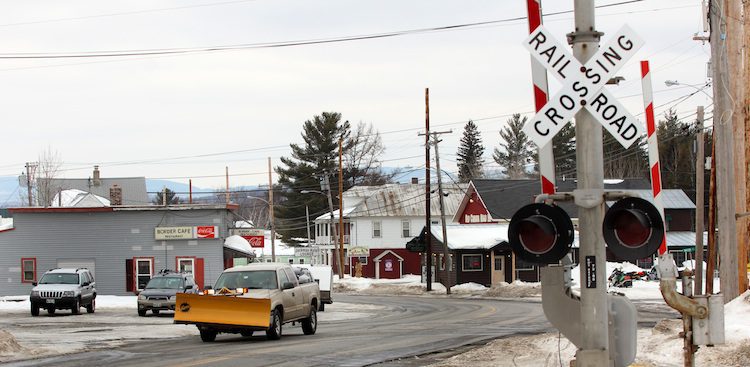Last week, protesters in Portland and Fairfield took to the streets to oppose the movement of oil tank trains through the state bound for the Irving Oil refinery in Saint John, New Brunswick. The events were part of a nationwide campaign against dangerous oil being transported through population centers.
But protesters needn’t have been concerned about Maine: Irving had already decided not to run any more oil trains through the state.
In interviews this spring in Saint John with top Irving Oil executives, they revealed to the Maine Center for Public Interest Reporting that the company had stopped using Maine as a route for oil shipments.
This was reaffirmed in an emailed statement from the company on June 30: “We currently do not transport crude by rail through Maine and have no future plans to do so.”
The protests commemorated the deadly derailment two years ago in Lac-Mégantic, Quebec, of a Montreal, Maine and Atlantic Railway train five miles from the Maine border. It was to have headed east across 200 miles of the state toward the refinery.
Instead, explosions of the train’s cargo of highly flammable crude from the Bakken oil fields of North Dakota incinerated the Quebec town’s center, killing 47 people.
“I’m thrilled,” responded Sass Linneken, spokesperson for Seeds for Justice, one of the Maine groups that organized the anti-oil-train protests, when she was told of Irving’s position.
But she also said: “I’d like to believe that’s true. We’re paying attention, and if they change their minds about that we plan not to make that an easy process for them” — meaning, she said, “creating a lot of public discourse.”
The Lac-Mégantic-to-Saint-John route has not been used for oil since the July 6, 2013 tragedy. But New-Brunswick-bound trains hauling the same kind of crude had continued to move on other routes within the state, from the south through Portland, Bangor and other populated areas. Those trips had dwindled in number and the last shipment was in February.
Interviewed during a tour of the refinery on May 1, Irving executives also said the company is not supporting a contentious proposal to have the flow of oil in the South Portland-to-Montreal pipeline be reversed to carry Alberta tar-sands oil from Montreal to Portland Harbor. The pipeline skirts Sebago Lake, Portland’s water supply.
Both the positions taken by Irving Oil and its openness in discussing them may indicate a turn toward a more public-friendly approach to its business, at least as far as Maine issues are concerned.
Historically, executives at the giant, privately owned oil company have been reluctant to speak with the press. After the Lac-Mégantic tragedy, the company was criticized for its silence as well as for its oil-train policies.
Jacques Poitras, author of the 2014 book Irving vs. Irving, commented by email that in giving extensive interviews, “Irving Oil is playing against type, and against the posture it has adopted.”
Poitras is a Canadian Broadcasting Corporation correspondent in Fredericton, the New Brunswick capital.
Safer methods
The cutback that occurred in the oil shipments through Maine was not connected to the fallout from Lac-Mégantic, refinery general manager Mark Sherman said, but because of global oil-supply-and-demand issues. (Sherman has since been promoted to be the oil company’s chief operating officer.)
Still, he added, pipelines are better ways to move oil than trains because they’re safer.
Oil trains continue to move to Saint John through Quebec and New Brunswick. But they only account for a small portion of deliveries to the refinery. Irving gets most of its crude oil by ship.
John Giles, CEO of the company that bought the bankrupt Montreal, Maine and Atlantic — renamed the Central Maine and Quebec Railway — was quoted in news reports saying he hoped his trains would carry oil again on the Lac-Mégantic route by 2016.
Sherman made it clear it won’t be to Irving: “We don’t bring crude oil through Maine any more.”
Giles’s response when told of Irving’s statement: “If Irv Oil says it’s not happening, then that’s the end of it, isn’t it? Not much more to say. Right?”
After the catastrophe, the tank-car labels were found to understate the flammability of the oil. Transport Canada, the nation’s chief transportation agency, served search warrants on Irving in late 2013.
“They were looking at things like safety training records,” Sherman said.
In a recent email, the transport agency said regarding Irving Oil: “Should non-compliance be found, Transport Canada will not hesitate to take appropriate enforcement action. It would be inappropriate to comment further on this investigation as it’s still ongoing.”
Without admitting responsibility for what happened, Irving, several other oil companies and shipper World Fuel Services have agreed to settle lawsuits arising out of the Lac-Megantic inferno by paying a total of $345 million to the victims’ families, the Canadian federal government, the province of Quebec, and the town of Lac-Megantic.
Irving Oil’s contribution is $75 million. The settlement is being considered by a Canadian court.
Pipeline dreams
In 2013 Irving Oil contributed $15,000 to the Portland Pipe Line Corporation’s efforts to be allowed to pump tar-sands crude from Canada to Maine by reversing the pipeline flow. The South Portland-based pipeline currently takes oil from ships and pumps it to Montreal refineries.
That flow has decreased as more crude has become available in Canada. The pipeline company is looking for customers. Irving’s refinery would be the closest for tankers leaving Portland Harbor with tar-sands oil.
But anti-oil activists put a measure on the South Portland ballot to block the tar-sands crude from coming to the city. Irving’s financial contribution was to the successful oil-industry campaign to defeat the ballot measure.
(Nevertheless, the city council voted subsequently to block the use of the pipeline for tar-sands oil, a move the pipeline company is now challenging in court.)
Kevin Scott, Irving Oil’s public affairs chief, said in Saint John that the contribution had been made because the company was concerned that, if the ballot measure passed, some current uses at the company’s South Portland terminal might be shut down.
“We’re not interested in crude oil movement” via the Portland pipeline, he added.
The company has a big potential alternative to the pipeline and the oil trains. It has joined with TransCanada Corporation to ask Canadian-government permission to bring 1.1 million barrels a day of tar-sands oil to Saint John via a $12-billion pipeline dubbed Energy East. It would be built totally within Canada.
In the interview, Mark Sherman, the refinery general manager, said, “The Energy East line is our end game.”







